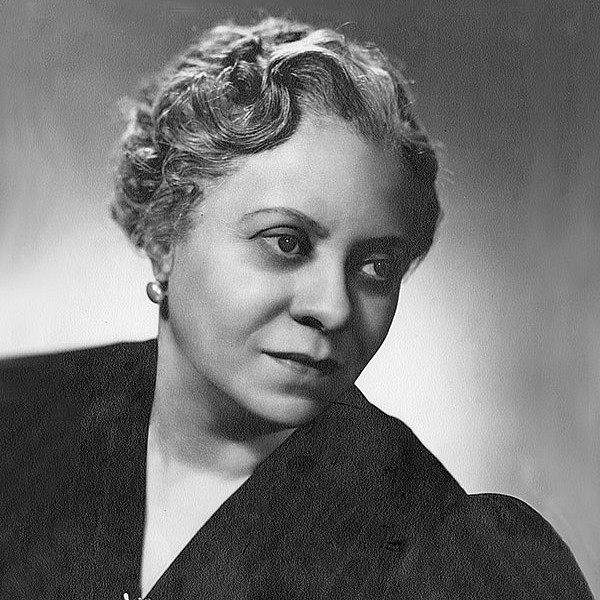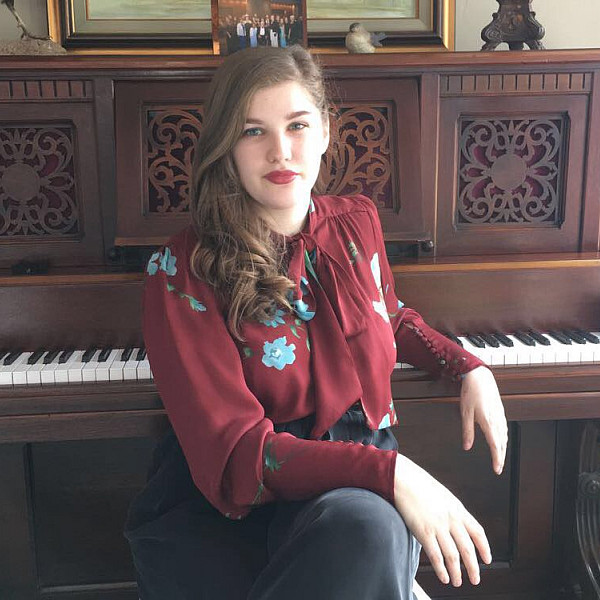News
Internationally Renowned Pianist Visits with Southwestern Students
November 12, 2020
November 12, 2020
Open gallery

Groundbreaking American pianist Lara Downes has collaborated with the likes of superstar cellist Yo-Yo Ma, Grammy Award–winning folk singer Judy Collins, New Yorker staff writer Adam Gopnik, and former U.S. Poet Laureate Rita Dove. Her genre-transcending albums, which include America Again (2016), Holes in the Sky (2019), For Love of You (2019), and the recent Some of These Days (2020), have topped the Billboard charts and been hailed by critics as “luscious,” “magnetic,” and “honest.” Although 2020 has been a tremendously difficult year for artists, Downes continues to make music and connect with her fans by recording at home and sharing her performances online. And just this month, National Public Radio (NPR) Music launched AMPLIFY with Lara Downes, a new biweekly series created and hosted by Downes, who engages Black musicians in raw, intimate conversations about diversity, heritage, progress, and, of course, music. A mere 24 hours after its release, the first episode, which features award-winning singer and multi-instrumentalist Rhiannon Giddens, had already earned approximately 24,000 views across all digital platforms.
Southwestern University is fortunate to have counted Downes as a resident artist, and the iconoclastic performer maintains a relationship with faculty and students today. In 2018, she treated community members to a program that included pieces by Billie Holiday, Leonard Bernstein, and George Gershwin (among many others) at the Alma Thomas Theater. During her residency, she began collaborating with Professor of Music Michael Cooper. The pianist and the musicologist bonded over their mutual interest in the pioneering Black composer Florence Price (1897–1953). Cooper dug into the archives to recover, edit, and publish the works of Price, publishing an astonishing 58editions in 52 weeks with G. Schirmer/AMP; Downes has recorded 20 world-premiere performances of the pieces, which sold out on vinyl but can still be enjoyed on Spotify. The pair has also collaborated on bringing to life pieces by civil-rights activist W. E. B. Du Bois (1868–1963) and acclaimed composer Margaret Bonds (1913–1972).
Downes’s most recent visit to Southwestern took place virtually on October 27, 2020, when she engaged with students in Cooper’s seminar Music Literature IV: Freedom, Movement, and Migration in Music. The session was “an extraordinary opportunity for our students,” Cooper says excitedly, not just because his students could interact with an eminent performer but also because Downes is “a major international player in the world for social justice.” In her music and NPR series—as well as in her published writing about musicians and other artists—Downes often explores history, race, gender, identity, and social progress. Her advocacy includes working with organizations such as the American Civil Liberties Union; Feeding America; the Sphinx Organization, a Detroit-based nonprofit dedicated to improving diversity in classical music; and Headcount, a nonpartisan group that promotes voter participation.
Because Downes is both a musician who often represents the underrepresented in her performances and an activist who seeks to make positive change in the world, her visit is helping Cooper’s undergraduates achieve their goal of expanding the scope of their studies to artists who might not have made the syllabus in decades past. Like the broader music curriculum at Southwestern, the Music Literature course sequence traditionally focuses on what Cooper describes in his blog as the “core ‘classical’ canon, arguably one of the whitest of all spaces in U.S. culture generally.” However, Cooper observed a few years ago that students were eager to think outside conventional catalogs of concert musicians, and he was eager to support their interest in examining “a broader, more inclusive, and [more] equitable” body of work. By “adopting an antiracist stance,” he says, his students could expand their perspectives as music lovers as well as future music educators and performers. “This particular cohort agreed to undertake this approach to the study of classical music and the ‘real world’ a year and a half ago,” he adds proudly, “and they have risen to the challenge.”
Shelby Avants ’21, a bassoonist who performs in Austin-area bands Skymomma and StarMind Ceremony and provides music lessons to a range of students, appreciates Downes as a role model. Because she hopes to attend graduate school and teach music performance and theory at a small liberal-arts university like Southwestern in the future, Avants is taking to heart Downes’s advice to pay attention to even the little things that can have an enormous impact on improving the inclusivity of music, such as using more direct vocabulary when discussing one’s body of work rather than calling it a repertoire, a French term that might alienate some new performers or audiences. “It was especially meaningful to have Lara Downes in our class because she is a female performer, she is an activist, and I have just never seen or heard of a female performer going to that level of activism,” Avants says. “She is definitely an inspiration. She is somebody I can look up to and see her strength and grace whenever she talks or plays her piano. I’m very grateful for that opportunity.”
Avants also expresses gratitude for getting to hear a private premiere of Downes’s exquisite interpretation of Bonds’s “Tangamerican,” which debuted online a week and a half after the class and will be published later this year by Hildegard Publishing Company. “I just think you can hear so much of who she is through her music,” Avants says admiringly.
Abi Peterson ’22 is a music education major who hopes to soon publish what Cooper describes as “the first-ever theoretically sophisticated article on music by Florence Price, adapted from a paper she wrote for my class last spring.” While analyzing the harmonic techniques of Price’s “Fantasie Nègre No. 2 in G Minor,” Peterson often relied on Downes’s rendition of the song during the six months she was writing the essay. So she relishes having had the opportunity to engage with the artist whose music she listened to on a loop while conducting her research. “Getting to talk to her and listening to the things she does—and she talks about it all so casually and humbly!—it’s so inspiring to me,” Peterson shares.
During the session, Downes discussed her experience of the past year—from canceled concerts due to the pandemic to the trauma of racial violence and division—as a period of loss but also rebirth and rebuilding, linking it to the renaissance of freedom songs and spirituals of the pre-Civil War and Civil Rights eras that she presents in Some of These Days. “It taught me what the work you do can accomplish when you’re not expecting it,” Downes shared with the students. “I was reimagining everything I do—the ways we communicate and contribute and what we can do with whatever we make.” It was a message that clearly had students reflecting on their own contributions as heads nodded vigorously in affirmation.
Though held in a Google Meet format, the conversation remained exemplary of the dynamic and truly fascinating discussions that happen every day in Southwestern classrooms. Downes, Cooper, and his students explored the importance of uncovering the music and stories that have been buried or lost to expand our understanding of the past as well as of what we define as “the classical tradition.” They reflected on the melding of various artistic traditions during the Great Migration, a period between 1916 and 1970 when six million African Americans moved from the rural South to the urban Northeast, Midwest, and West. They expressed their opinions of remote concerts. And Downes shared her thoughts on how “devastation and upheaval can inspire creative output” and how we value musicians and artists through the centuries not because of some “extraterrestrial genius” but rather because of the shared humanity—the struggles against oppression, the emotional turmoil, or the spirit of triumph—that can connect musicians and audiences across centuries and “reconcile the past with the present and the future.”
“That was an amazing experience,” Avants says. “I will never forget having that conversation with my classmates and Lara Downes.”
Peterson couldn’t agree more. She appreciates how Downes advocates inclusivity and uses her podcasts and other platforms to amplify the voices of her fellow musicians because, as Peterson paraphrases Downes, “The world deserves as much beauty as it can get.” Preferring ensembles to solos and showcases to competitions herself, Peterson, who has played trombone for 10 years and hopes to teach high-school band after graduation, was amazed that Downes practiced those same commitments to inclusion and amplification in the way she interacted with Cooper’s class. “Every time somebody said something, she honed in on it but then connected it to everybody else on the call. The way that she talks reflects the way that she carries herself. That’s awe-inspiring!”
“Whatever you bring to the world, don’t think about making huge steps every day but changing one small thing every day. Hold onto that.”
As the class wound down, some students asked about Downes’s award-winning work as an advocate and activist—questions that reflect not just a turbulent year of protests promoting social justice but also SU students’ commitment to positive change. As they reflected on historic songs and readings representing the human will to survive but also the despair, powerlessness, and disconnection felt by many during the past months and even years, Downes left Cooper’s class with a rousing call to action that hit home with Avants and “really resonated” with Peterson (not to mention this interloper). It’s advice that all of us could certainly benefit from heeding: “The things we can do are small things, and if we do the small things, then all those things add up, and that’s how we can have power and make change,” Downes explained. “Whether it’s in the practice of making music or fixing the environment or systemic racism, … the little, tiny things you can accomplish can correct the big things. Whatever you bring to the world, don’t think about making huge steps every day but changing one small thing every day. Hold onto that.”

















